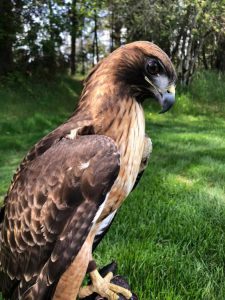Red Tailed Hawk (Buteo jamaicensis)
Taxonomy
Kingdom: Animalia
Phylum: Chordata
Class: Aves
Order: Falcinformes
Family: Accipitidae
Genus: Buteo
Species: Buteo jamaicensis
Conservation Status in Idaho
Least Concern
US Migratory Bird Act
Protected
Range and Habitat
The red tailed hawk is found throughout the United States, Canada, Mexico and Central America. Birds that are found farther north will migrate south during the fall to avoid harsh winters. Red tail habitats are typically open areas with scattered, elevated perches that include scrub desert, plains and montane grasslands, agricultural fields, pastures, urban parks, patchy coniferous and deciduous woodlands and tropical rainforests.
Physical Features
Red-tailed hawks are sexually dimorphic, that is there is a clear distinction between male and females. Females are 25% larger than males.
Weight: 2–3.5 lbs (900–1,590 g)
Length: 1.4–2.0 ft (43–61 cm)
Wingspan: 3–4.5 ft (0.9–1.4 m)
Red-tailed hawks range from light auburn to deep brown in color with a lighter underbelly. The legs, feet and cere (soft skin at the base of the beak) are yellow. The tail is brownish-red resulting in their name.
Diet
Mice, rats, rabbits, lizards, snakes and other birds.
Lifespan
10-20 years in the wild and up to 30 years in captivity.
Reproduction
Read-tailed hawks reach sexual maturity at three years. They are typically monogamous and mate with the same individual for many years. Both the male and female build the nest, typically in tall trees, cliff ledges and artificial structures such as buildings. Females lay 1-5 eggs at the beginning of April and both parents will incubate the eggs for 28-35 days. The chicks begin to leave the nest after 42-46 days with the fledgling period lasting up to another 10 weeks.
Social Behavior and Interaction
Red-tailed hawks are monogamous and remain together in the same territory for years. Their territories range in size from 0.5mi – 2.5mi (0.85km – 4km) depending on the amount of food, perches and nest sites. Both aggressively defend their territory frequently chasing off other hawks, eagles and great-horned owls.
Major Threats
Major threats include shootings, collisions with automobiles, human interference and lead poisoning from eating food items that contain lead shot.

